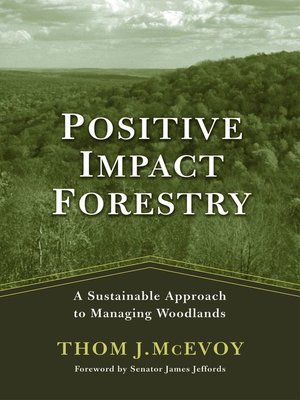
Sign up to save your library
With an OverDrive account, you can save your favorite libraries for at-a-glance information about availability. Find out more about OverDrive accounts.
Find this title in Libby, the library reading app by OverDrive.



Search for a digital library with this title
Title found at these libraries:
| Library Name | Distance |
|---|---|
| Loading... |
Positive Impact Forestry offers private landowners, forest managers, and conservation-minded professionals a clear, practical roadmap for managing woodlands in ways that sustain both ecological health and long-term economic value. Rather than focusing solely on low-impact practices, Thom McEvoy introduces a forward-thinking approach that actively enhances the vitality of forest ecosystems while meeting the real-world needs of families, communities, and future generations.
Grounded in the latest forestry science, this comprehensive guide explains how decisions about harvesting, soil management, and silviculture can influence everything from biodiversity to soil organisms to timber quality. McEvoy presents core concepts—like forest soils, tree physiology, and regeneration dynamics—in a highly accessible format, making the science understandable and actionable for non-specialists and seasoned professionals alike.
The book also addresses key financial and legal considerations, offering guidance on working with forestry professionals, diversifying revenue beyond timber, and ensuring that land management legacies can be passed on across generations. Case studies and examples help illustrate how values-driven forestry practices can create measurable benefits over time—without compromising the ecological integrity of the land.
Recognized by the National Woodland Owners Association as the "Best Forestry Book for 2004," Positive Impact Forestry remains a trusted resource for anyone committed to thoughtful, sustainable forest stewardship that balances today's goals with tomorrow's responsibility.
Grounded in the latest forestry science, this comprehensive guide explains how decisions about harvesting, soil management, and silviculture can influence everything from biodiversity to soil organisms to timber quality. McEvoy presents core concepts—like forest soils, tree physiology, and regeneration dynamics—in a highly accessible format, making the science understandable and actionable for non-specialists and seasoned professionals alike.
The book also addresses key financial and legal considerations, offering guidance on working with forestry professionals, diversifying revenue beyond timber, and ensuring that land management legacies can be passed on across generations. Case studies and examples help illustrate how values-driven forestry practices can create measurable benefits over time—without compromising the ecological integrity of the land.
Recognized by the National Woodland Owners Association as the "Best Forestry Book for 2004," Positive Impact Forestry remains a trusted resource for anyone committed to thoughtful, sustainable forest stewardship that balances today's goals with tomorrow's responsibility.







